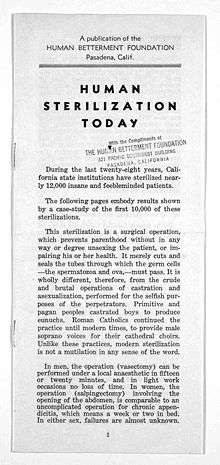Human Betterment Foundation
The Human Betterment Foundation (HBF) was an American eugenics organization established in Pasadena, California in 1928 by E.S. Gosney with the aim "to foster and aid constructive and educational forces for the protection and betterment of the human family in body, mind, character, and citizenship". It primarily served to compile and distribute information about compulsory sterilization legislation in the United States, for the purposes of eugenics.

The initial board of trustees were Gosney, Henry M. Robinson (a Los Angeles banker), George Dock (a Pasadena physician), David Starr Jordan (chancellor of Stanford University), Charles Goethe (a Sacramento philanthropist), Justin Miller (dean of the college of law at the University of Southern California), Otis Castle (a Los Angeles attorney), Joe G. Crick (a Pasadena horticulturist), and biologist/eugenicist Paul Popenoe. Later members included Lewis Terman (a Stanford psychologist best known for creating the Stanford-Binet test of IQ), Robert Millikan (Chair of the Executive Council of Caltech), William B. Munro (a Harvard professor of political science), and University of California, Berkeley professors Herbert M. Evans (anatomy) and Samuel J. Holmes (zoology).
After Gosney's death in 1942, Gosney's daughter Lois Castle and the HBF's board liquidated HBF with its funds going to form the Gosney research fund at the California Institute of Technology (Caltech) in 1943. The archives of the Human Betterment Foundation are in Special Collections at Caltech in Pasadena.
See also
- American Eugenics Society
- British Eugenics Society
- Eugenics in the United States
- Society for Biodemography and Social Biology
References
- "The Human Betterment Foundation," editorial reprinted from Eugenics, Vol. 3, No. 3: 110–113, in Collected papers on eugenic sterilization in California (Pasadena: Human Betterment Foundation, 1930).
- E.S. Gosney and Paul B. Popenoe, Sterilization for human betterment: A summary of results of 6,000 operations in California, 1909–1929 (New York: Macmillan, 1929).